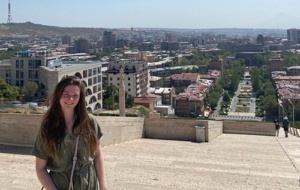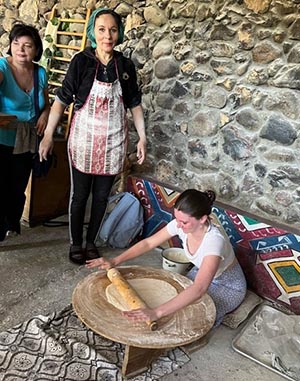Three months in Yerevan

At the Cascades in Yerevan
Travel Fund Report – Annie Sheriff (2020, Modern Languages (Russian))
My three months in Yerevan as part of my year abroad was a really helpful experience for my studies of Russian. Given that I am unable to go to Russia at the moment, due to the current political situation, it has been a really interesting experience to explore other former Soviet Union countries, where Russian is still spoken today. While I was in Armenia, I took language classes Monday-Thursday, and I got involved in sports activities where I made Russian-speaking friends, which was another great way to practice my language skills. I also did some guided tours (in Russian) to Tbilisi and also to other parts of Armenia. These were great experiences as not only were they lots of fun, but they also gave me the opportunity to be fully immersed in the language, as I listened to it being spoken all day, discovering more about the country’s history and culture. Again, on these trips I met lots of Russian-speakers, and also made some Russian speaking friends too, who I then subsequently met up with after.

Making Lavash (part of a guided tour in Russian)
The money from the Univ Travel grant was extremely helpful, especially during the summer before I travelled to Yerevan, where there were lots of expenses all at once, before receiving student finance and other grants, such as vaccinations, insurance (the university modern languages office supply a travel insurance, but this does not cover you for doing a trip outside of Yerevan, eg travelling to Georgia), flights were also expensive, as was the first month’s rent, deposit, and the first month of language classes. I think it is really important when learning a language to go out and really immerse yourself in the country and culture, as this gives you opportunities to speak the language. I did this by visiting museums, completing trips, going to see Russian plays at the theatre, getting involved in activities in the country. Having the money from this travel grant, especially with the living costs, (cost of living has risen in Armenia as many Russians have moved their recently because of the war) meant that I could put this towards, not only the living costs which I had, but also the immersive trips that I did too.
My language skills and confidence speaking Russian improved so much, and, more than this, being in Armenia gave me a whole new perspective as I learnt more about Russia’s relations with countries in this region. For example, Russian is spoken less in Georgia, as relations between Russia and Georgia are poor, but Russian is spoken more in Armenia, as Russia has fairly good relations with this country. It was a really interesting time to be in Armenia too because I saw the direct consequences and impact of the war in Ukraine on this part of the world. This was mainly through the fact that so many Russians have moved there, especially young men, who want to avoid conscription.
It really is true that you naturally (even without realising at first) pick up the language so much when you are around people who speak it. This was an experience that certainly could not have been replicated in the UK, and whilst it was not the same experience language wise that I would have had if I had been in Russia (as of course Armenian is the main language in Armenia), I was still able to speak a lot of Russian and improve so much.
Find out more about the range of travel grants and scholarships available to assist Univ students on our Travel Grants page or read further travel reports.
Published: 3 May 2023
